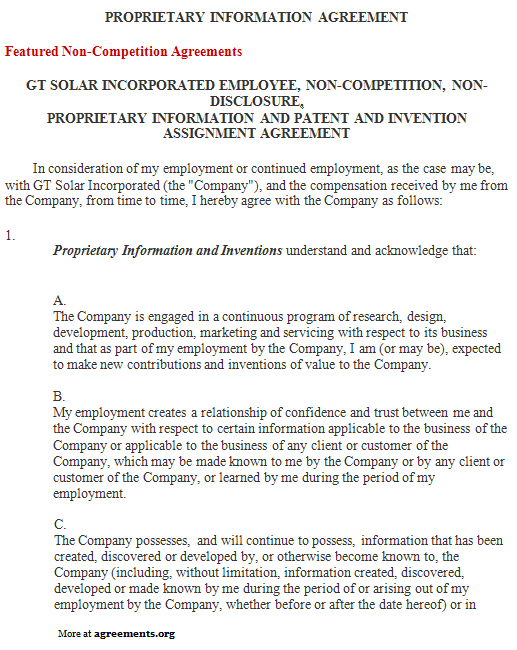A proprietary information agreement is a legal contract between the organization and its vendors or employees which stipulates that the latter must not disclose confidential information to third parties. The employees of organizations, as well as the vendors, have access to trade secrets and other confidential information regarding an organization like business strategies and so on. Since there are two parties involved, hence they are known as bipartite agreement. Proprietary information is any data that relates to the company which could be misused by rival companies if they are revealed. This would lead to losses for the company. Proprietary refers to products sold and protected under a registered trade name.
When do you Need Proprietary Information Agreement?
A proprietary information agreement is required when an organization wishes to hire an employee or appoint a vendor. The purpose of a proprietary information agreement is to ensure that the confidential data relating to the company is not disclosed by the employee or the vendor. There is usually sensitive corporate information involved which should not be available to the general public. A proprietary agreement is drafted to protect the interests of the company, which could be an employer or a client, in the event the staff or vendor divulge confidential information, this violation could lead to severe penalties or imprisonment.
Inclusions in Proprietary Information Agreement
The proprietary information agreement should include the names of the company as well as employee or vendor, depending on whom the agreement is being made. Since there are two parties to the agreement, it is known as a bipartite agreement.
A proprietary agreement template should also include the effective date of the agreement, details of proprietary information between the disclosing party and receiving party, duty of confidentiality specifying the use of proprietary information by the third party, exceptions to the duty of confidentiality stating the information that can be disclosed by the receiving party, export compliance provision restricting disclosing information outside the country, and no license or intellectual property where the information has to be returned by the receiving party or destroyed. The events which lead to termination of the proprietary agreement are also included.
How to Draft Proprietary Information Agreement
While drafting a proprietary information agreement it is important to consider the following points:
- The parties to the agreement and the relationship shared between them should be mentioned
- Promise by the employee not to disclose, copy, summarize or publish from the company premises except as required to carry out their assigned responsibilities
- Agreement by employee not to engage in an activity which would be competitive with the organization’s current or proposed business activity
- The rights and responsibilities of the employee or vendor on termination of the agreement are to be stated. This includes the return of all confidential information in different format or patented inventions.
- The employee needs to state that he or she has understood the terms and conditions of the agreement and is willing to abide by them.
Benefits of Proprietary Information Agreement
The benefits of a proprietary information agreement are:
- Protecting sensitive information: The agreement ensures that the employees or vendors appointed by the company do not disclose the confidential company-specific information to third parties for their benefit. The interest of the organization is protected through such agreements.
- Legal recourse: The company can take legal recourse in the event the staff or vendor does violate the terms of the agreement. The penalties in case of any disclosure can range from fines to imprisonment.
- Business advantage: With confidential company information being secure because of this agreement, the organization is able to get a competitive advantage in the industry and this leads to higher profits.
Key Terms in Proprietary Information Agreement
The key terms of a proprietary information agreement are:
- Proprietary information: The information that the receiving party gets from the disclosing party
- Indemnity/survival provision: Compensation payable to the disclosing party in terms of damages, attorney fees, awards or costs due to any breach by the receiving party
- Governing law provision: This specifies the state that governs the contract
- No license/intellectual property: This states that the receiving party has to either return or destroy the proprietary information
- No joint venture provision: The agreement does not lead to a partnership
- Amendment provision: The rules regarding any changes to be made in the contract
- Termination/survival: The date till which the contract is effective until terminated.
- Assignment provision: The receiving party does not have rights to others unless permitted by the disclosing party.
- Exceptions to the duty of confidentiality: This specifies the limit of the receiving party regarding disclosure
Types of Proprietary Information Agreement
The types of proprietary information agreement are:
- Intellectual property: When a business has new invention, they use a patent to protect it. A trademark can also be used for protection of an organization’s goods and services. These agreements can protect both tangible and intangible products.
- Non-disclosure agreement: Non-disclosure agreements are required when someone you employ has access to your confidential information. These include employees, customers, vendors and independent contractors. This limits the sharing of your business information. The legal remedies in case of breach of contract are also mentioned.
- Non-solicitation agreement: This ensures that your main employees don’t solicit business from your customers for a specified period of time after they leave your employment.
If you are employing in-house staff or a vendor, it is important to have a proprietary information agreement to ensure data confidentiality.
You can download a sample proprietary information agreement template here.
Sample Proprietary Information Agreement
